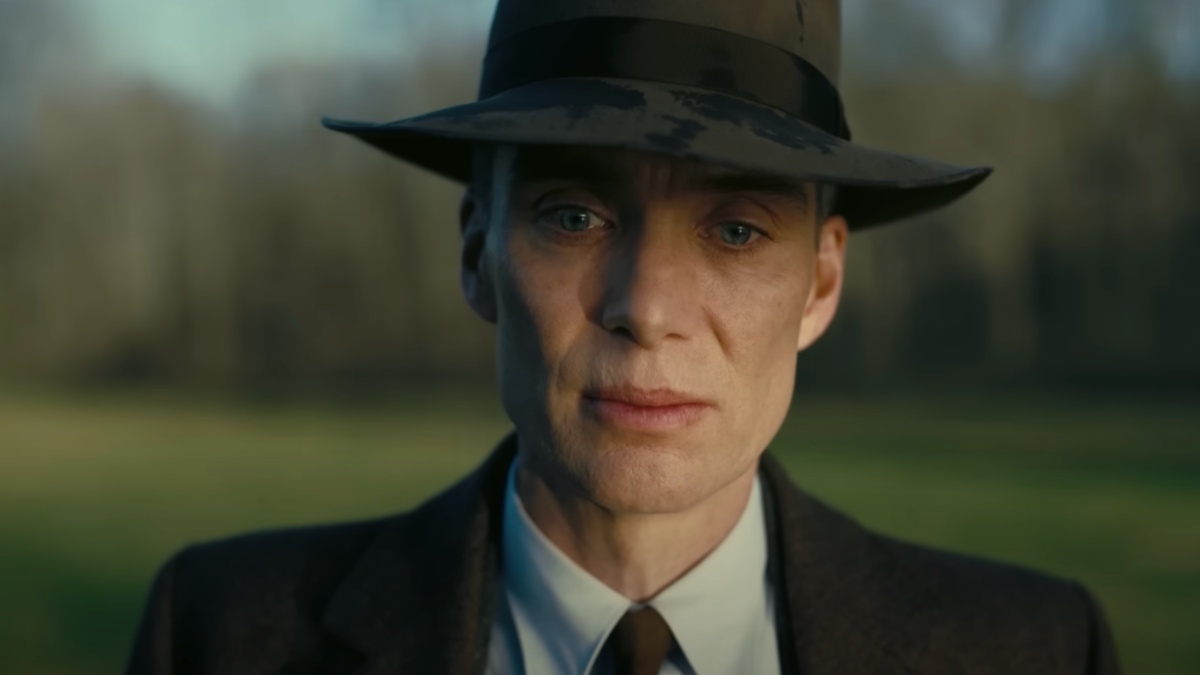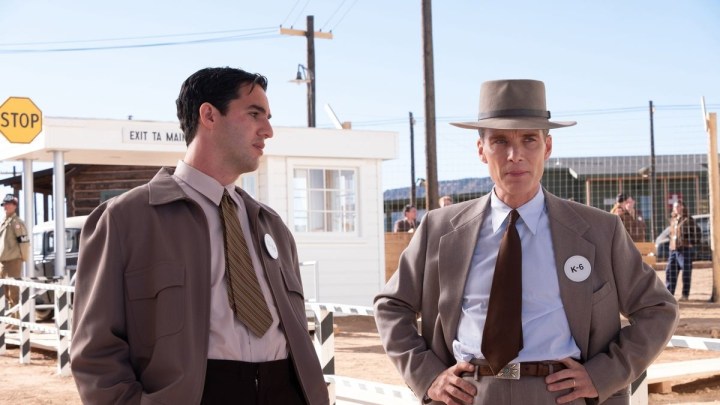
A few weeks ago, Christopher Nolan’s towering historical blockbuster Oppenheimer landed on Blu-ray. Within days, the disc sold out everywhere, disappearing from online retail inventories and brick-and-mortar shelves alike. In an age when physical media is supposedly on its deathbed, pushed to the brink of extinction by the convenience of streaming, here was what used to be called a “home-video release” so in demand that it started fetching the exorbitant resale rate of a cult classic long out of print. Such is the anomalous power of a pop-culture sensation whose success we’re still finding new ways to quantify.
By most metrics that count, Oppenheimer was the movie of 2023. Plenty of fans — including, incidentally, the author of this article — would argue that it’s actually the best film of the year: a dazzling cerebral spectacle that views the dark legacy of its subject, the so-called Father of the Atomic Bomb, as a chain reaction of political, philosophical, and existential consequences. But even with the question of its artistic merit set aside, Oppenheimer still looms impossibly large over the year in cinema. Nothing else achieved such a perfect fusion of multiplex popularity, rapturous acclaim, and mass cultural curiosity. No, not even Barbie, the chipper, brightly colored yin to Oppenheimer‘s depressive, muted yang.
Nolan’s film will probably always, to some extent, be linked in the public memory to Greta Gerwig’s: Their simultaneous release fueled a jokey hashtag rivalry that morphed, through internet enthusiasm, into a mutually beneficial double-feature idea for the ages. But after weeks of sold-out screenings, Oppenheimer‘s record-breaking run can’t be solely attributed to the Barbenheimer experience. And if Barbie decisively won the box-office showdown, surpassing all expectations to outgross everything else released over these past 12 months, its own outrageous success doesn’t look nearly as unlikely as people forming proverbial lines around the block to see a three-hour drama about quantum physics.

At a time when the yearly box office is dominated by intellectual property aimed at all ages, Oppenheimer thought outside the toy box — and made more than most of the movies that didn’t. You have to go back nearly a decade, to the massive turnout for American Sniper, to see a chart-topper of such adult appeal — or further back still to find a summer movie event so grave and freighted with historical significance. Down to specific July release window, Oppenheimer recalls the seismic impact of 1998’s Saving Private Ryan, the Greatest Generation juggernaut from one of Nolan’s clearest influences, Steven Spielberg. A monumental, kid-unfriendly R-rated hit arrives about once a decade at best.
Even within the narrower field of grown-up phenomena, Oppenheimer is an outlier. There’s little precedent for a smash of this particular profile, this rare recipe for success. It’s a war drama without the war — which is to say, without the action-cinema hook that made Sniper and Ryan attractive to sensation junkies, too. It’s a pricey studio tentpole, shot partially in black-and-white and structured like a math equation, that mostly amounts to men standing around in rooms debating scientific theory or weathering a Beltway inquisition. By no normal bean-counter calculus does such a movie make a billion dollars.

Of course, brainy blockbusters are a Nolan specialty. And no filmmaker alive can claim the kind of brand loyalty he’s built — a household name status that’s even more remarkable when one considers the kind of structurally complicated nesting-doll thrillers, like Inception or Dunkirk, that helped get him to this place. Oppenheimer is the ultimate proof of Nolan’s ability to transform just about any premise into a cash cow by virtue of his own advertised involvement.
It also confirms that the writer-director has built a name for himself as strong as any globally recognized superhero insignia; 15 years after The Dark Knight rocketed him to the A-list, Nolan has fully emerged from under the shadow of the Bat and brought the audience with him. After all, superhero movies hit the skids in 2023. Globally speaking, Oppenheimer outperformed all of them — a victory symbolically fortified by the presence of a rejuvenated Robert Downey Jr. putting Iron Man way behind him with his best performance in years.

That something so downbeat could connect with so many moviegoers is just one more curious aspect of this success story. Oppenheimer isn’t just dryly dialogue- and process-driven. It’s a colossal bummer: a Great Man biopic that concludes that its Great Man essentially destroyed the world. Did the film go over huge in spite of its doomsday gravity or because of it? Viewers seeking a mirror, gray more than black, of their own technological anxiety could find it in a portrait of a man pushing the boundaries of scientific advance without enough thought of the ramifications. Every scary new headline about, say, the proliferation of AI echoed the dread of Nolan’s decades-spanning tragedy.
And the movie’s apocalyptic resonance disturbingly expanded as summer gave way to autumn. It formed an accidentally timely triangle with Killers of the Flower Moon and The Zone of Interest — bleak, withering dramas about genocide and complicity. Like those like-minded movies, Oppenheimer speaks to a contemporary world either turning a blind eye to or — like the stomping gymnasium crowd that haunts Cillian Murphy’s culpable Oppie — actually cheering on mass murder and destruction. The global breaking news of this fall only seemed to underscore its sickening vision of national self-defense and patriotic purpose as blank checks to wreak havoc without restraint.
All of which made Oppenheimer very much a movie of the moment — a feel-bad hit for our feel-bad age, perfectly calibrated to capture the imagination of an audience perpetually scanning the horizon for the bloom of some new mushroom cloud. If Barbie brightened countless spirits (and capitalized handsomely on the ability to do so), Oppenheimer was there to dampen them with a history lesson about how screwed we all are on a species level. Maybe its fatalism was commiserative and cathartic. Or maybe Nolan just knows how to coat bitter pills in mesmeric style; even at their most despairing, his movies proceed with an infectious momentum, the exhilarating race of his montage.
Anyway, there were glimmers of hope, too, in the explosive prosperity of Oppenheimer. You could see them in the way this big, talky drama — the very definition, on paper, of a movie strictly for older audiences — drew a spectrum of demographics, speaking to an 18-34 crowd often accused of having no attention span. And through its popularity and Nolan’s evangelism, the movie drew mass numbers of viewers to the magic of 70mm and now, apparently, to the practical necessity of physical media. It’s increasingly looked like a gateway drug, opening wormholes into new worlds of cinephiliac appreciation.

On the most basic level, the success of Oppenheimer demonstrated the viability of Hollywood movies with more on their minds than a potential franchise, of the kind of movies we’re usually told are not worth the investment anymore. It showed that if the vision looks grand enough, audiences might come in droves, no matter how dark or seemingly dry the subject matter. Whether Oppenheimer proves a bellwether for more ambitious big-budget dramas, including ones not directed by filmmakers of Christopher Nolan’s clout, remains to be seen. But watching it conquer the collective imagination was reason for a little optimism, even as the movie’s upshot — dark as the endings of $100-million blockbusters get — offered pessimism of an almost chemical purity.
Oppenheimer is now available to purchase from various digital services or (if you can find a copy) on Blu-ray.



